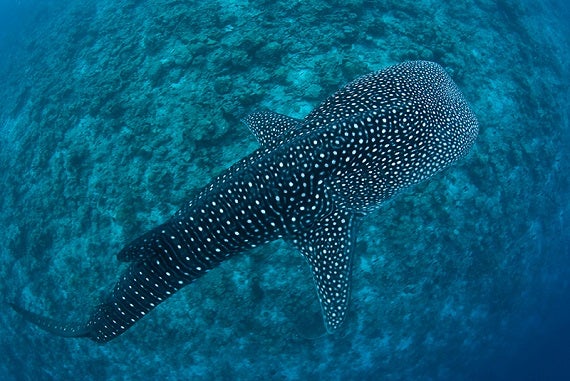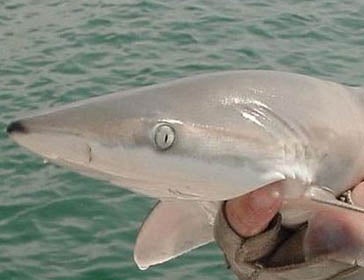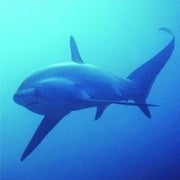Sharks
 Sharks have been swimming the world’s oceans for more than 400 million years. While they have survived mass extinction events, sharks have not evolved to withstand overexploitation by humans. These top predators are in serious trouble due to heavy fishing pressure, shark finning and bycatch.
Sharks have been swimming the world’s oceans for more than 400 million years. While they have survived mass extinction events, sharks have not evolved to withstand overexploitation by humans. These top predators are in serious trouble due to heavy fishing pressure, shark finning and bycatch.
Of the 307 shark species assessed by the International Union for Conservation of Nature (IUCN), 50 are listed as vulnerable,endangered or critically endangered, but only the white whale and basking sharks are protected internationally under the Convention on International Trade in Endangered Species (CITES). Sharks now represent the greatest percentage of threatened marine species on the IUCN Red List of threatened species.
As apex predators, sharks play a vital role in maintaining the health of marine ecosystems, serving as an indicator of ocean health. Sharks are slow-growing, late-maturing, long-lived and give birth to few young, making them extremely vulnerable to overexploitation.
Today, sharks are considered target species in many EU fisheries. Their fins, exported to Asian markets ,are used for preparing traditional soups, and their livers, intended for the international cosmetics industry, are now among the most expensive products from the sea. In addition, many species are frequently caught as bycatch.
The lack of data on catches and trade complicates the assessment of the status of shark populations and the development of optimal regimes for fisheries management of sharks. Even so, there is evidence that they are being caught in an unsustainable manner and that some biologically vulnerable populations are below sustainable levels.
To learn more about the importance of sharks, click here.
What Oceana Does
 Changes in legislation:
Changes in legislation:
Oceana works to eradicate “finning ”, cutting off fins and throwing the body overboard while the shark is still alive. This practice has increased as Asian countries demand more fins for “shark fin soup”, while also raising the price of the fins.
In Europe, Oceana is focused on creating solid regulations for fishing different shark species. Spain harbours the most important fleet.
This organisation regulates the large pelagic fishery, as well as the tuna fishery, and establishes TACs and quotas for some shark species. Oceana works to create measures tailored for the different populations, and to achieve the establishment of management plans for all shark species targeted by different fisheries.
For more information on the importance of sharks, click here.
Species at Risk
 Basking Shark (Cetorhinus maximus)
Basking Shark (Cetorhinus maximus)
 Blacknose Shark (Carcharhinus acronotus)
Blacknose Shark (Carcharhinus acronotus)
 Caribbean reef shark (
Caribbean reef shark (
 Common thresher shark (Alopias vulpinus)
Common thresher shark (Alopias vulpinus)
 Dusky shark (Carcharhinus obscurus)
Dusky shark (Carcharhinus obscurus)
Great white shark (Carcharodon carcharias)
 Lemon shark (Negaprion brevirostris)
Lemon shark (Negaprion brevirostris)
Longfin mako shark (Isurus paucus)
 Nurse shark (Ginglymostoma cirratum)
Nurse shark (Ginglymostoma cirratum)
 Oceanic whitetip shark (Carcharhinus longimanus)
Oceanic whitetip shark (Carcharhinus longimanus)
 Sandbar shark (Carcharhinus plumbeus)
Sandbar shark (Carcharhinus plumbeus)
 Sandtiger shark (Carcharias taurus)
Sandtiger shark (Carcharias taurus)
 Scalloped hammerhead shark (Sphyrna lewini)
Scalloped hammerhead shark (Sphyrna lewini)
 Shortfin mako shark (Isurus oxyrinchus)
Shortfin mako shark (Isurus oxyrinchus)
 Small spotted catshark (Scyliorhinus canicula)
Small spotted catshark (Scyliorhinus canicula)
 Spiny dogfish (Squalus acanthias)
Spiny dogfish (Squalus acanthias)


 Blue shark (Prionace glauca)
Blue shark (Prionace glauca) Deep-sea Shark
Deep-sea Shark Porbeagle shark (Lamna nasus)
Porbeagle shark (Lamna nasus) Whale shark (Rhincodon typus)
Whale shark (Rhincodon typus)